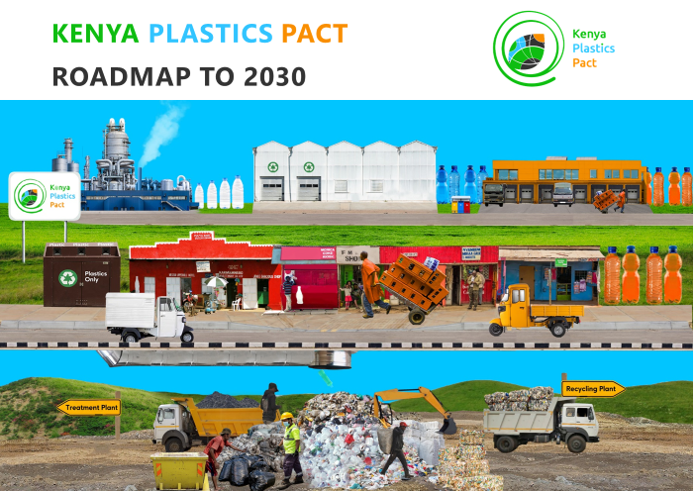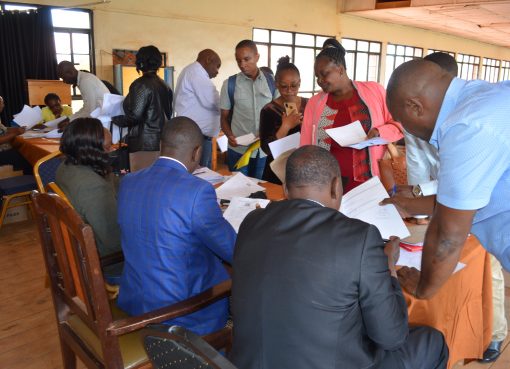The Kenya Plastics Pact has published a roadmap to ensure all plastic packaging in the country is recyclable or reusable by 2030.
More than 30 business members and supporters of the Kenya Plastics Pact, with representatives from every stage of the plastics packaging supply chain, have signed and endorsed the Roadmap.
They include plastic packaging manufacturers, prominent Fast-moving consumer goods (FMCG) brands, committed small and medium businesses, informal waste pickers’ associations and recyclers, influential industry associations, environmental NGOs, advocacy groups and civil society, and the national government, as well as the national government through the Ministry of Environment and Forestry.
“The Kenya Plastics Pact Roadmap reflects a powerful voice for tangible change by 2030 and will guide and mobilize the industry to tackle plastic pollution by taking collective action. The Roadmap activities are elaborate and based on Kenya’s context and the current situation in the country in terms of waste management, plastic pollution, the economy, the policy landscape, and available infrastructure,” says Ms. Karin Boomsma, the Pact’s Secretariat Lead.
An estimated 22,000 tonnes of waste are generated in Kenya per day, about 20% of it is plastic. Furthermore, Kenya’s daily plastic consumption is estimated to be 0.03 kg per person.
Available data shows that the full amount of plastic that becomes waste in Kenya is approximately 0.5 to 1.3 million tonnes per year. Out of this, only 8% is recycled, with the remainder being landfilled or incinerated – or in the worst-case scenario, ending up in the environment. This is why plastic waste and pollution have particularly captured the attention of businesses, governments, and citizens in Kenya.
According to the Kenya Private Sector Alliance (KEPSA) CEO Ms. Carole Kariuki, a radical transformation in how we use natural resources is central to meeting the needs of future generations.
“There is no question about it, the world needs a new economy; a circular economy, which keeps plastics in use and out of the environment. It is now more relevant than ever to bring the whole value chain together, and build collective solutions adapted to our reality,” says Kariuki.
She adds, “It requires an ‘all-in’ approach from industry, citizens, and the government to ensure policy priorities are budgeted and appropriated for the economy to fully go circular. Companies need to strategically integrate circularity in their value chains, to increase sustainable economic development and resilience.”
The Roadmap establishes four strategic targets for 2030 which includes to eliminate unnecessary or problematic single-use plastic packaging items through redesign, innovation, and reuse delivery models and ensuring that 100% of plastic packaging is reusable or recyclable.
“This is a shared action plan that shows a cross-sectoral plan of outcomes and activities which when achieved, will stimulate industry-led innovation, dialogue, and collaboration to create new business models with product redesign in mind, generate job opportunities in the plastics collection and recycling sector, and position businesses competitively with improved economic, environmental, and societal outcomes overall,” says Dr. Ayub Macharia, Director of Environmental Education and Awareness in the Ministry of Environment and Forestry.
He reiterates that “The government through the Ministry of Environment and Forestry is happy to see initiatives like the Kenya Plastics Pact that support national efforts toward achieving a cleaner and safer environment for all.”
The Roadmap goes a long way in supporting the implementation of the Extended Producer Responsibility (EPR) Regulations, which aim to enhance resource use efficiency, stimulate innovation, spur recycling, and reduce the amount of waste destined for final disposal; as provided for by the Sustainable Waste Management Act. But while it is a necessary regulatory framework to move toward a circular economy, mandatory EPR alone does not provide the collaborative platform for unlocking innovation and systemic solutions for a Circular Economy.
Marcus Gover, the WRAP CEO, says, “WRAP is delighted to have supported the Kenya Plastics Pact in the development of the Roadmap to 2030 which will mobilise not just the Pact’s signatories but also the wider plastics industry in Kenya to tackle the plastic pollution crisis. The UK Plastics Pact Roadmap launched almost four years ago and has helped transform the plastics value chain in the UK – we hope the same will be true in Kenya.’’
The development and implementation of the Kenya Plastics Pact are led by Sustainable Inclusive Business Kenya (SIB-K), the Secretariat to the Pact and the Knowledge Center under the Kenya Private Sector Alliance (KEPSA); with support from WRAP – the UK-based global environmental NGO, and initially funded by MAVA Foundation and UK Research and Innovation (UKRI). The Pact is part of the Ellen MacArthur Foundation’s Plastics Pact Network and is the second in Africa after the South African Plastics Pact.
By Joseph Ng’ang’a





